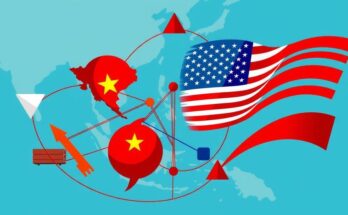President Trump reaffirmed his tariffs on Canada and Mexico, sparking debates about their economic implications. Critics, including Delaware economist Robert Fry, predict these measures could lead to a recession, emphasizing the long-term negative effects on trade and increased prices. Discussions are ongoing among lawmakers regarding the potential for negotiation and resolution of trade issues amidst concerns of retaliatory tariffs from affected nations.
In a recent address, President Donald Trump reinforced his commitment to implementing tariffs on Canada and Mexico, with significant implications for the United States economy. He stated, “Other countries have used tariffs against us for decades, and now it’s our turn to start using them against those other countries.” The tariffs announced include a 25% rate on Canada and Mexico, along with a 10% tariff on China.
The announcement led to a substantial decline in stock market indices, though a rebound was observed subsequently. Criticism of these tariffs is notably present among Democrats, citing inflation and grocery price increases as economic concerns. Republican perspectives seem more cautious, with calls for negotiation and resolution rather than immediate implementation of such tariffs.
Delaware Senator Chris Coons expressed skepticism, stating, “Trump promised again last night to make America affordable again. But this isn’t going to help make it more affordable.” Meanwhile, Republican Congressman Ryan Mackenzie suggested a more nuanced approach to the issue.
Furthermore, Mr. Trump plans to enact reciprocal tariffs with all trading partners starting on April 2, establishing a policy where any tariffs imposed on the U.S. would be met with equal measures. He projected that these tariffs could yield “trillions” of dollars and stimulate job creation by encouraging companies to relocate to the U.S.
In stark contrast, Robert Fry, the chief economist at Robert Fry Economics LLC, provided a sobering perspective. He contended, “It’s not going to spur the economy, and it’s not going to help the sector of the economy it’s intended to help.” Fry criticized the historical precedent of tariffs, noting that the U.S. had moved away from high tariffs since World War II.
Fry highlighted that while the rationale for reciprocal tariffs may seem logical, it deviates from the historically supported case for unilateral free trade. He warned that prolonged tariffs on Canada and Mexico could lead the U.S. into a recession, stating, “I think if the tariffs on Canada and Mexico stay in effect for more than a few weeks, I think we have a recession.”
The potential repercussions extend further, as Canadian and Mexican authorities have signaled intentions for retaliatory tariffs in response to the U.S. actions. Trump’s rationale centers on encouraging neighboring nations to combat fentanyl trafficking into the U.S., yet the broader impact remains a concern.
During a phone conversation with Canadian Prime Minister Justin Trudeau, the White House revealed a one-month pause on auto-tariffs related to Canada and Mexico, but other tariffs remain unchanged. The president acknowledged potential short-term disturbances, stating, “There will be a little disturbance, but we’re OK with that,” even as Fry cautioned that sustained tariffs would lead to increased prices and depressed auto production.
In summary, President Trump’s tariffs on Canada and Mexico may have significant economic consequences, including potential recession if these measures persist. Despite contrasting opinions on the potential benefits, experts like Robert Fry offer warnings about the repercussions such tariffs could have on trade dynamics. Ultimately, the situation urges careful deliberation as neighboring countries prepare retaliatory actions, thus further complicating the economic landscape.
Original Source: www.cbsnews.com




